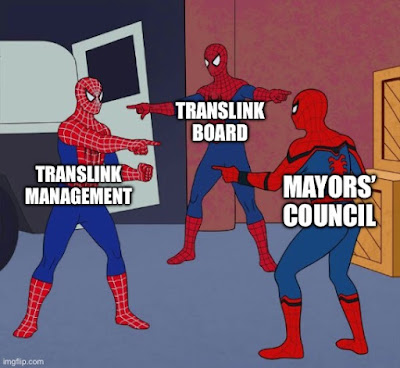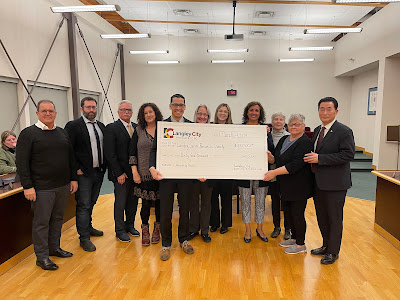About a month ago, I was at a Mayors' Council on Regional Transportation meeting where we heard from around a dozen delegations on a specific alignment for a proposed RapidBus route running through Burnaby. Recently, I've received emails from others in Burnaby about this proposed RapidBus project.
I am a member of the Mayors' Council, one of two governing bodies of TransLink, and we've heard many presentations from residents and received many emails about how folks would like to see transit service changed. There is one problem. The Mayors' Council doesn't control the day-to-day operations of TransLink; the TransLink Board does. The TransLink Board is independent and autonomous from the Mayors' Council. The Board is comprised of a majority of unelected folks.
I would bet that 95% of people in Metro Vancouver think that the Mayors' Council controls and oversees TransLink even though we don't in reality. People expect, rightfully so, that democratically elected folks have control over public services such as transit.
Not to get too much into the weeds, but the Mayors' Council is responsible for raising fares and taxes for TransLink and setting the high-level direction for transit and road investments. The TransLink board is responsible for TransLink's annual budget and oversees day-to-day operations. TransLink management is controlled by and accountable to the TransLink board, not the Mayors' Council.
The simplest way I can describe this TransLink governance setup is like the US Congress with its House of Representatives and Senate (if the US Senate was unelected). If things are going well, we slowly progress, but it doesn't take much to jam up the works.
Here is a simple example of the silliness of TransLink governance. The Mayors' Council approved the Bus Rapid Transit route roughly along 200th Street, connecting Maple Ridge to Langley City via the Township of Langley, while the TransLink Board will approve the actual detailed alignment of this Bus Rapid Transit route.
I would have said no if you asked me a year ago if TransLink governance was an issue. Today, I think it is an issue. What brought this to light for me is the process of trying to solve TransLink's pending bankruptcy.
The main problem is that the Mayors' Council is accountable to the public for TransLink, but we are not responsible for its day-to-day operations. Accountability and responsibility have to be linked.
Originally, TransLink only had one governing body comprised of a majority of elected folks. The current governance setup came about when the province and region disagreed on the timing of the Canada Line versus the Evergreen Extension. The province wanted the Canada Line to be built first due to the 2010 Olympics. The province stripped the region of day-to-day decision making over TransLink because of this disagreement.
To set up TransLink for continued success, considering the enormous financial and service delivery challenges we must address, we need to go back to one governing body of elected folks to oversee TransLink to ensure we can move forward in a good way.
















